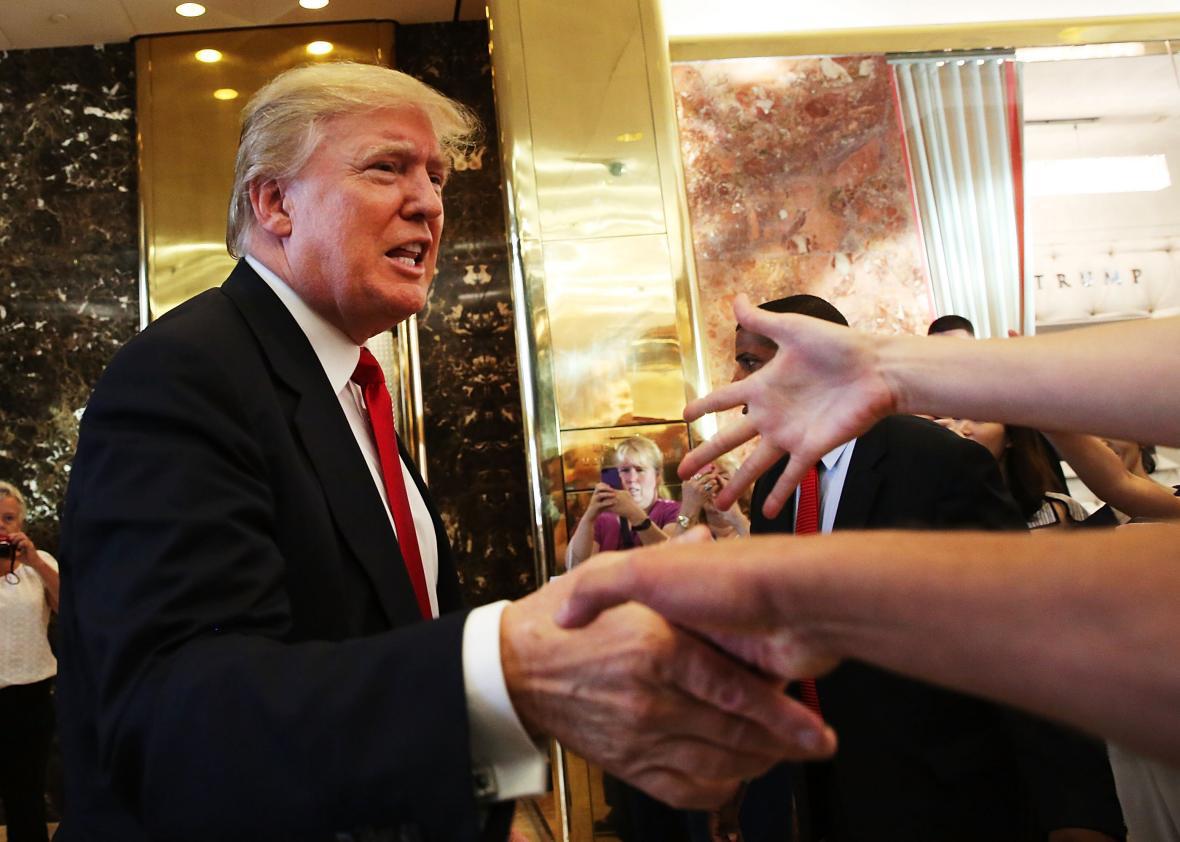It’s usually easy to tell when Donald Trump is bending the truth. He flip-flops so shamelessly, rejects well-known facts so eagerly, denies so readily any bonkers statement he made on video just days earlier, that it doesn’t take much mental strain to summon evidence that he’s lying.
And during Sunday’s presidential debate, there was a moment when it seemed inevitable that many allegations of sexual assault would surface against Trump before Election Day. When Anderson Cooper asked Trump point-blank whether he’d committed the assaults he bragged about in the 2005 Access Hollywood video that came out on Friday, Trump dithered for an uncomfortable several seconds, forcing Cooper to repeat his question two more times, before offering a diluted “no”:
COOPER: Just for the record, though, are you saying that what you said on that bus 11 years ago that you did not actually kiss women without consent or grope women without consent?
TRUMP: I have great respect for women. Nobody has more respect for women than I do.
COOPER: So, for the record, you’re saying you never did that?
TRUMP: I’ve said things that, frankly, you hear these things I said. And I was embarrassed by it. But I have tremendous respect for women.
COOPER: Have you ever done those things?
TRUMP: And women have respect for me. And I will tell you: No, I have not.
Over the last few days since the debate, several women have come forward with further allegations that Trump sexually assaulted them, forced open-mouthed kisses on them, and deliberately walked in on teen girls while they were changing clothes. In their accounts, three of Trump’s new accusers specifically cite Cooper’s question as their impetus for going public. Watching Trump flat-out deny something they say they experienced firsthand was infuriating enough to warrant an email to the New York Times, a personal essay in People, and a message to the Palm Beach Post.
For many of us laywomen of the world who’ve never met Trump or been victim to his alleged acts, the candidate’s tepid denial capped off a yearlong crescendo of stories that reminded us of every time we’ve been harassed, groped, peeped on, or coerced into sexual acts. Women who’ve experienced these violations have finely tuned radar for a man whose disturbing “locker room talk” pales in comparison to the stuff he actually does. Trump’s habitual boasts of exactly how he mistreats women sound too real, too fitted to the rest of his character—to say nothing of the striking similarity of the allegations against him—to be false.
Female friends and acquaintances, including several Slate colleagues, have told me that Trump has resurfaced deeply buried or forgotten memories of sexual assault, some stretching back to childhood. If Trump’s current media omnipresence has dredged up some of the most painful, distressing moments in our lives, it’s partly because everything Trump says and does aligns with the motives, behaviors, and defenses we remember of the men who violated us. In the past week, our suspicions that Trump was a serial sexual abuser have crystallized into near certainty.
In the Access Hollywood recording, Trump told Billy Bush of grabbing women’s genitals, “When you’re a star they let you do it. You can do anything.” That same year, he told Howard Stern that he’s “allowed” to enter contestants’ dressing rooms during the pageants he then owned under the guise of “inspecting it.” He said he’d barge in while contestants were changing (“They’re standing there with no clothes,” he said) and pretend to be making the benign rounds of a pageant owner. Rarely do we ever get to hear a man so honestly explaining how his privilege allows him exploit women, and how his status makes them afraid or unwilling to protest. A man with such an understanding of how he can use his fame and money to bend women to his will—and such an eagerness to show it off to others—does not, in all likelihood, stop at talk.
Trump has also caused some women I know to rethink past sexual violations they’d previously explained away to themselves as misunderstandings or petty instances of “boys being boys.” Trump’s talk and his accusers’ allegations are awakening long-dead zombies in our memories, forcing us to confront assaults we’d never labeled as such.
Trump’s rise also brings a secondary wave of recognition: that millions of Americans will vote for a man they know to be a cruel misogynist at best and a sex criminal at worst. It’s comforting to think of Trump as an outlier when it comes to shrugging over sexual assault; as Michelle Obama said in a deeply emotional address on Thursday, painting Trump’s bus talk as the stuff of everyday locker room conversation is “an insult to decent men everywhere.” If Trump is an outlier, he’s the most-loved, best-defended, highest-ascending outlier in history. But the proliferation of voters and political leaders willing to overlook the disturbing allegations against Trump and his own admissions of sexual assault suggest that he’s not just an outlier. A powerful man who victimizes women can cause a lot of damage, but it rarely festers and spreads without enablers.
